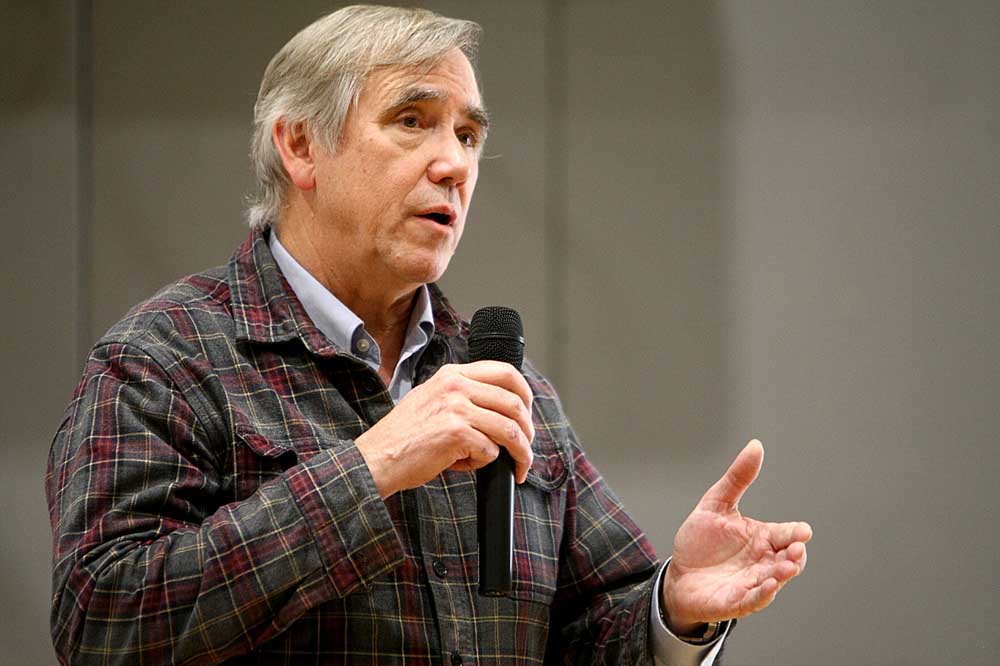Wyden fundraising strong as Democrats’ Senate majority wobbles
Published 1:45 pm Saturday, April 23, 2022

- U.S. Sen. Ron Wyden, D-Oregon, wants the Food and Drug Administration and the Drug Enforcement Administration to end the shortage of Adderall and other medicines that has been ongoing since the summer of 2022.
U.S. Sen. Ron Wyden, D-Oregon, has raised $11 million over the past two years, solidifying his spot among the “solid Democrat” seats on the 2022 electoral map.
The five Republicans running in the GOP primary have raised less than $500,000 all together.
Trending
Wyden’s latest Federal Elections Commission report lists over $7.87 million still in his campaign fund.
Since winning a special election for the seat in 1996, Wyden has been re-elected four times to full six-year terms, never receiving less than 57% of votes cast.
Despite a slump in President Joe Biden’s approval rating, Wyden’s re-election is rated as “strong” or “solid” among major political forecasters, including the Cook Political Report, FiveThirtyEight, and the Center for Politics at the University of Virginia.
While impressive by Oregon standards, Wyden’s political bankroll is small when compared to some other Senate races.
The Federal Election Commission reported that as of Saturday, candidates running for the 35 U.S. Senate seats on the ballot this year had raised $797.8 million.
Republicans totaled $405.4 million while Democrats had raised $389.3 million.
Trending
Sen. Raphael Warnock, D-Georgia, had raised over $67 million to defend the seat he won in a 2020 special election. Sen. Tim Scott, R-SC, has raised $41.9 million.
Sen. Mark Kelly, D-Arizona, was third at $38.9 million. He also won a 2020 special election and now must run for a full six-year term.
The Senate fundraising is part of the flood of money reported to the FEC.
During 2021, candidates for the U.S. Senate and U.S. House raised $1.3 billion and spent $720 million. Political parties raised $862.6 million and spent $668.3 million.
Political action committees supporting a specific cause or group raised $3.2 billion and spent $2.5 billion.
Wyden is chair of the Senate Finance Committee. While the odds-on favorite to win re-election, Wyden’s role in the Congress that convenes in January could change for the second time in two years.
Republicans were a majority in the Senate through 2020, but lost control to Democrats when the election gave Democrats 48 seats, along with two independents who caucus with the party. The total of 50 seats matched the number of Republican senators.
The 50-50 tie was broken by the election of President Biden and Vice President Kamala Harris. The vice-president also holds the largely symbolic position of president of the Senate. Harris can break some tie votes, but more importantly, she gives Democrats and their allies an official majority, which include the chairmanship of committees.
History shows that holding onto the majority will be tough. Over the past 100 years, the party of a newly-elected president has lost seats in the U.S. House at the first midterm all but twice — in 1934 amid the Great Depression and 2002 in the first voting after the 9/11 terrorist attacks.
Because all House seats are up for election every two years, it is a barometer of the nation’s political mood.
Tying the election of senators to the popularity of a president is more difficult. The 100 senators are elected in three staggered “classes.” The party of the president typically loses Senate seats in the first midterm.
There are 35 Senate seats up for election in 2022 — 21 held by Republicans and 14 held by Democrats.
The majority of seats up for election are considered safe for the current party incumbent — including Wyden, a Democrat, in Oregon.
Among incumbents on the ballot, Democrats in Arizona, Georgia and Nevada are in races considered a toss-up to retain their seats.
On the Republican side, Ross Johnson of Wisconsin is considered vulnerable.
The volatility of the 2022 Senate elections has been increased by the decision of five Republicans and one Democrat to not seek re-election to another term.
The Republican-held seat in Pennsylvania is rated as a toss-up, while polling in North Carolina has the state slightly leaning toward Republicans.
In the latest campaign finance report, Wyden showed he had raised $11.25 million since Jan. 1, 2021, while spending $6.78 million and has $7.87 million in the bank.
The Wyden totals dwarf the five Republicans seeing the GOP nomination. Darin Harbick of McKenzie Bridge has been the most active fundraiser, taking in $265,699.
None of the four other Republicans has raised more than $67,000.
Sen. Jeff Merkley, D-Oregon, who was re-elected in 2020 is already raising and spending money for his likely 2026 re-election bid. The FEC reported Merkley took in over $1.3 million and spent $772,000 since the beginning of 2021. Including money raised in earlier years, he has $4.24 million in the bank.





